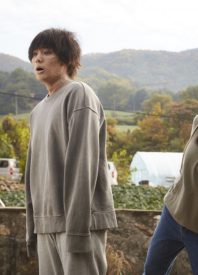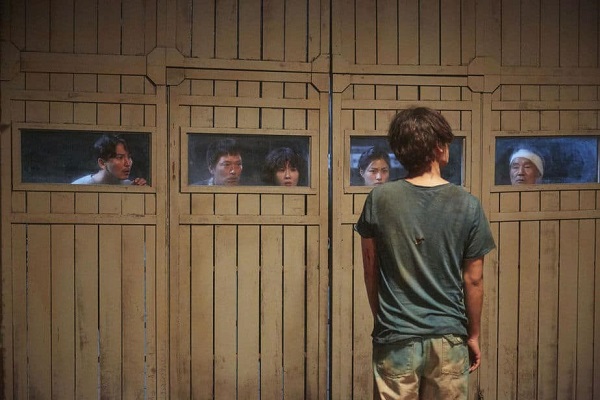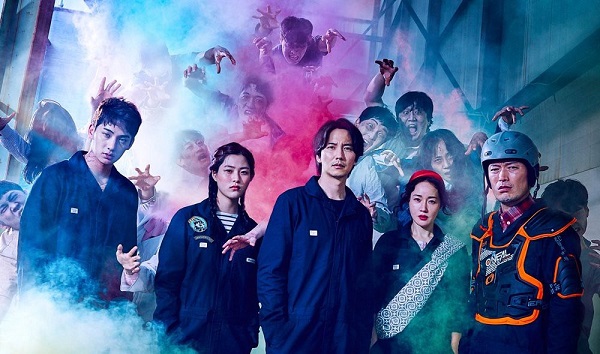
Before my screening of Zombie For Sale (then known as The Odd Family: Zombie on Sale) at Toronto After Dark Film Festival last October, first time director Lee Min-jae instructed me and the rest of the present audience to simply try and get into the flow of the film. It was truly great advice that augmented my experience with the film, and also suggests that Lee truly understands the material he has created. It’s advice I brought back into this re-watch of the film, and it’s advice that I can safely say is how I believe the film begs to be seen.
Unfortunately, this advice is also reminiscent of what the film’s general focus is. Zombie films are one of the great social commentary genres. From Night of the Living Dead, to 28 Weeks Later, zombies often take on a greater social meaning. They become metaphors for those propagating consumerist culture, fear of the other, the sick, the dying, you name it.
It’s hard to tell what the social metaphor of Zombie for Sale is, precisely because there likely isn’t one outside of a shoehorned in finger-wagging at medical capitalism. You might be able to point to the fact that the virus is supposedly the result of insidious pharmaceutical testing as possible evidence of a greater meaning; however, this is literally brought up at through radio exposition mere seconds into the film, and is never really explored again. I’d argue that it better manifests itself in the way that the main family of the film tries to use the zombie as a profit motive. Truly, I wonder if the film needs a deep theme. It probably doesn’t, but it’s undoubtedly a luxury that would be nice.
In Zombie for Sale, our main family are the Parks, a who run a small mechanical shop in rural Korea. Our introduction to them comes as they find themselves overcharging a couple who winds up necessitate some auto repair. “Cash only,” the elder matriarch informs the couple. Times have clearly been tough.
Meanwhile the titular zombie (Jung Ga-ram) for sale finds himself wandering the countryside. Our introduction to him is a gag where two rapidly conversing middle aged women completely ignore him as he wiffs on taking a large chunk out of them. Two boys then torment him, believing him to be a hobo. He is chased by a dog, set to some musical arrangement so cliched, Apple probably used it as “farcical comedy chase,” as a loop for the old Garageband.
The effect of this choice is that it disarms our perceptions of who this zombie is. Zombies connotate flesh-eating monsters, where a single bite or scratch turns you into a mindless monster as well. Here, he’s more akin to a wounded animal than a nightmare of the living dead. Ultimately, it sets up for when he becomes Jjong-bi, a member of this family trying to make it by (which, as an aside, lies my qualms with the film’s re-titling; they are an odd family, but a family nonetheless).
My biggest frustrating with re-watching Zombie for Sale is being reminded of just how slow the films first half is. Which simultaneously means that I was unprepared for just how explosive the films second half is. Let’s be upfront here: few who sit down to watch a film with “zombie” in the title are there to care about the set-up. They’re here to see action, horror, comedy, or best of all, a mix of all three. The people demand blood! It’s something the second half delivers in spades. I’ll give Lee credit where it’s due; he’s especially skilled at crafting a compelling action set-piece, and is skilled to an extent that surprisingly few modern horror pastiches manage to reach.
Ultimately, as a pleasant genre exercise it succeeds. It’s a film of two halves; one part a rags-to-riches family comedy, the other an apocalyptic joy ride. The second half offers greater entertainment than the first, and nothing in the first tops the film’s final, gut-busting gag (although the family introduction to Jjong-bi done in a wickedly humorous long take from outside the barn comes close). Zombie for Sale knows what it is. The faster you get on board, the more enjoyment you’re likely to have.



